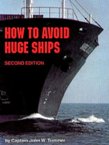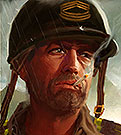BBfanboy
Posts: 18046
Joined: 8/4/2010
From: Winnipeg, MB
Status: offline

|
quote:
ORIGINAL: spence
quote:
Could be interesting. I am a bit put off by the orange gasoline explosion for a torpedo strike (which was usually a white column of water with a lot of black explosive and debris in it).
The option to pick up survivors while the U-boat is still around is also unrealistic - convoys had shallow-draft rescue ships for this purpose so taking a warship out of the escort for the purpose was not generally done. The only time my dad's corvette rescued people was after they sank a U-boat and saved some of the crew. At that point they were part of an H/K group, far away from the convoy they started in.
I haven't read anything suggesting that Fleet Fletcher DDs were used to escort ordinary convoys in the Atlantic. That is what DEs and similar escort vessels were for. Fletchers would have been welcomed for their speed, radar, sonar and gunpower, but their store of ASW weapons was not great.
So call me picky - but I wish designers would model the real conditions these men fought in - open bridges for the most part, cold and damp, tempestuous seas, green crews (from the rapid expansion of navies), old merchant ships belching too much smoke and not always able to keep convoy speed, and multiple U-boats making near-simultaneous attacks. If the game puts the "first person" leader in charge of the entire escort, giving orders to the vessels while trying to block all the U-boat attacks, that would be a plus.
_____________________________
Probably most of the Fletcher Class of DDs went to the Pacific...I sure recognize a lot of the names from my pbem that's gotten into mid 1944.
I think that open bridges were a British/Commonwealth thing. I was on several US Coast Guard Cutters that escorted convoys in the North Atlantic in WW2 and they had enclosed bridges where one could take temporary (important word that) shelter from the atrocious weather (it was still atrocious in the late 70's anyway).
In his book "Convoy" which concerns itself with several convoys that transited the Atlantic in mid March 1943 the author (Middleton I think) speaks specifically to the importance of rescuing survivors. Merchant seamen were civilians after all and the idea that if they got torpedoed getting rescued was something of an incentive to sign on to another voyage. Since they were not subject to military discipline it was important to give them that incentive. (I remember seeing a copy of the yearbook from the US Merchant Marine Academy for 1944 - they had a thing called the "Tin Fish Club". Some of the members got their admission to the club posthumously while on their cadet cruise).
At the start of the war (1939-41) some escorts did stop to pick up survivors as a first priority. After a couple of them got torpedoed while doing so, it became clear that the number one priority was to keep the U-boat from attacking. Escorts might drop rubber rafts and such for the survivors but would not go back to pick them up until there was no sign of the U-boat. Early escorts mostly lacked radar and there were so few of them they were needed to protect the rest of the convoy. The location of survivors was radioed in and if a ship was available to try and find them it was sent, but many had no rescue.
_____________________________
No matter how bad a situation is, you can always make it worse. - Chris Hadfield : An Astronaut's Guide To Life On Earth
|
 Printable Version
Printable Version






















 New Messages
New Messages No New Messages
No New Messages Hot Topic w/ New Messages
Hot Topic w/ New Messages Hot Topic w/o New Messages
Hot Topic w/o New Messages Locked w/ New Messages
Locked w/ New Messages Locked w/o New Messages
Locked w/o New Messages Post New Thread
Post New Thread